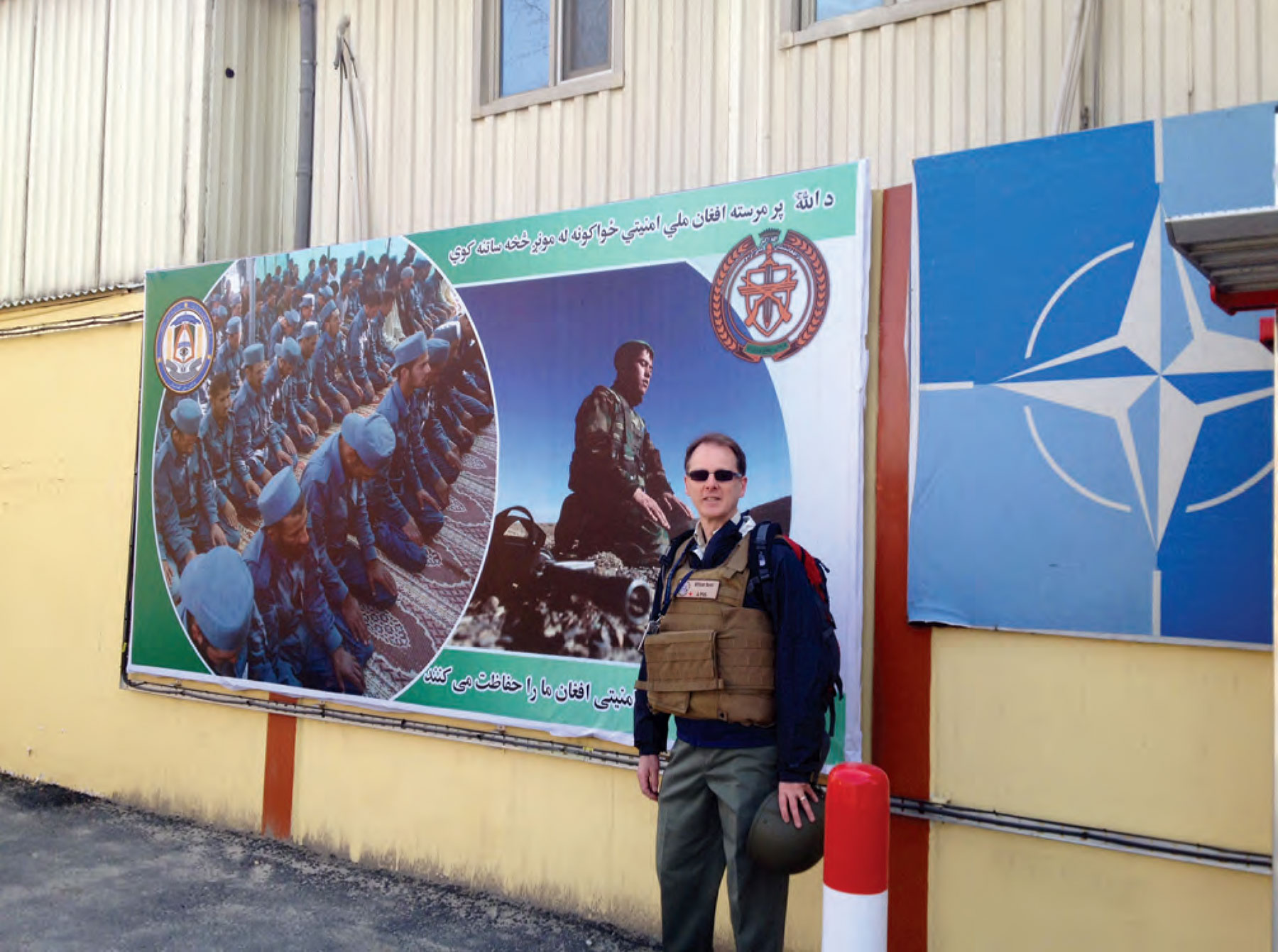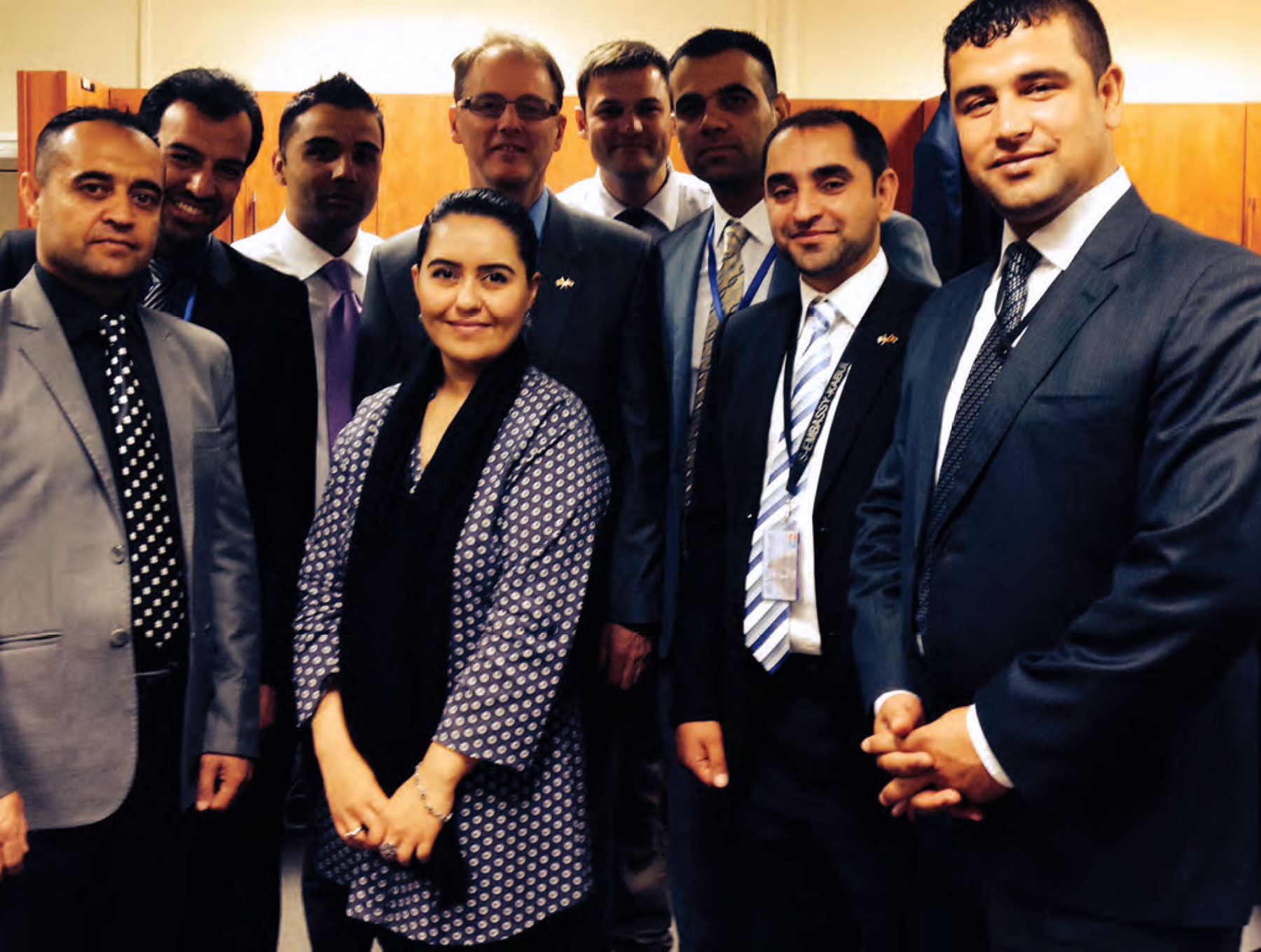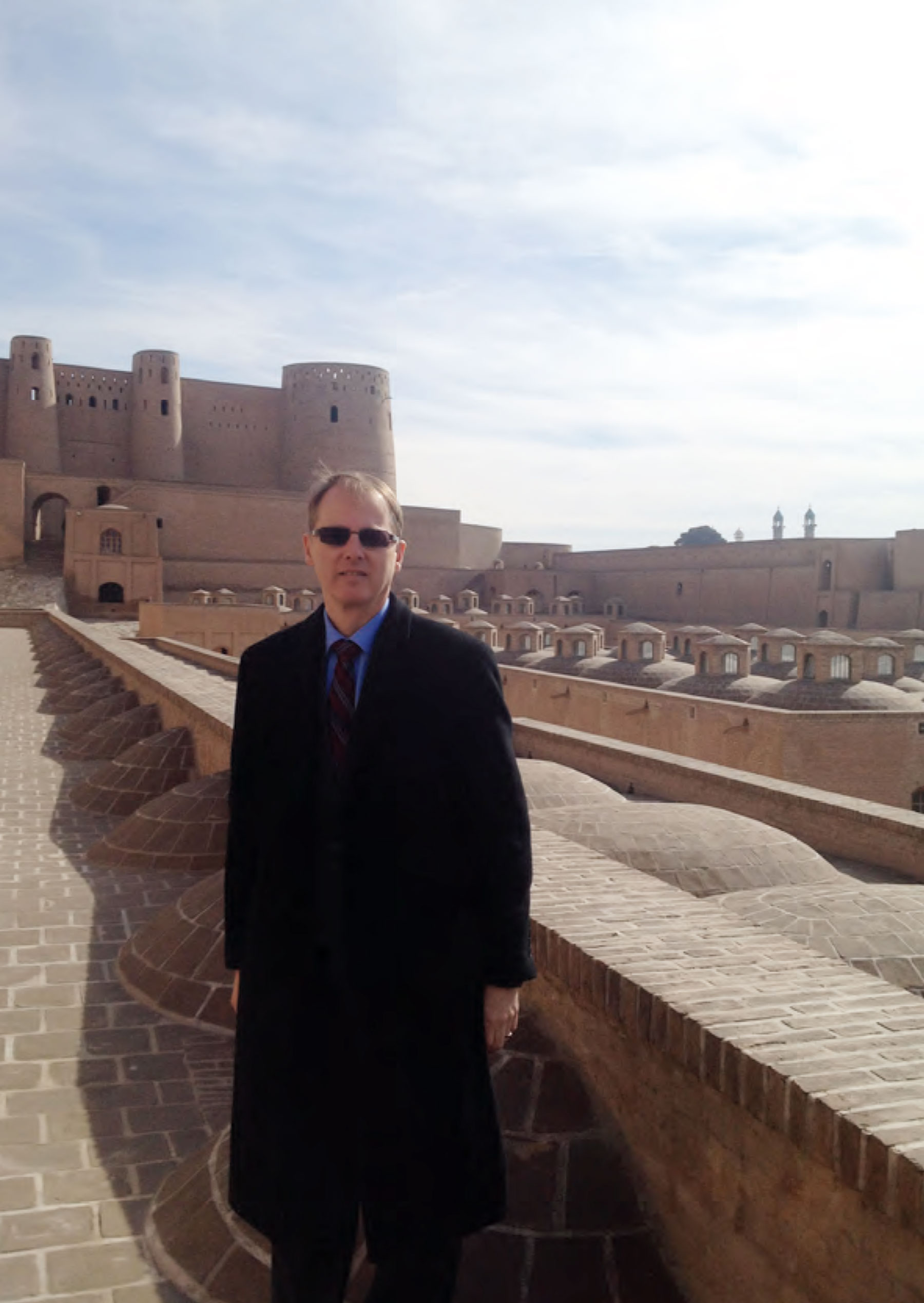Serving at Embassy Kabul
Life on a secure compound in a war zone is somewhat surreal.
BY BILL BENT

William Bent at the International Security Assistance Force base.
Courtesy William Bent
Trying to capture what it is like living and working as a diplomat in Afghanistan is a bit like the Indian parable of the blind men and the elephant. In the story, each blind man feeling different parts of the elephant has a different view on how to describe it. Their individual impressions, while true, are not entirely so, at least not in the sense of describing the elephant in its totality. Similarly, one’s impressions and experiences of Afghanistan depend on what one has touched or, more accurately, what has touched each unique individual. My thoughts may, therefore, be different than the impressions others have come away with; but there are certain experiences common to all.
The critical security threat colors everything here, governing how we live, work and play. The adage, that soldiering is 99 percent boredom and 1 percent sheer terror, applies equally well to diplomatic service here. The weekly Selectone security tests and the periodic “duck and cover” drills become routine background noise, and it is easy to become complacent. But then something occurs—like an early Christmas morning indirect fire attack—to give us a taste of that 1 percent terror and jolt us back to the reality that there are people outside the wire who want to kill us.
Given this, it is remarkable that we are able to conduct the work of diplomacy as effectively as we do. But the fact is that, although movements outside the compound are limited to “mission-essential” trips, officers from the senior leadership down to entry level are able to travel to meetings in Kabul to meet with their counterparts. Many also travel to our field locations in Herat, Mazar-e-Sharif, Bagram and Kandahar; and our colleagues there regularly engage with Afghans. Some sections have developed creative ways to successfully conduct outreach and diplomacy via social media and hosting events and meetings on the embassy grounds.
As cramped as our living conditions are, they can be oddly comforting for some. Minimalist living has its advantages.
There have been some interesting debates in these very pages about the nexus between security and the ability to conduct effective diplomacy, but we are able to get the basic work done to support U.S. foreign policy. As one colleague notes, however, “What is missing here is our ability to develop deep, ongoing relationships with our contacts.” The “mission-critical” standard for travel outside the compound does not allow for this, meaning that we are not able to call upon close relationships to subtly shape issues as our colleagues serving in other countries can.
Minimalist Living
Living on a secure compound in a country at war is somewhat surreal, with the barbed-wire walls, guard towers, ubiquitous (but overwhelmingly friendly) Nepalese guards armed to the teeth and frequent overflights from International Security Assistance Force helicopters. Although employees occupying senior positions and married couples are all assigned to apartments right off the bat, the majority of staff here—about 80 percent—live in 10-by-12 (or smaller) Container Housing Units, referred to as CHUs or hooches (also spelled hootch, the word usually refers to a thatched hut and is derived from the Japanese word uchi).
Most folks prop their twin beds up on foot-high leg extensions to allow for storage under the bed, a practical step. But if you are prone to tossing and turning, it is a precarious one. Some, however, are quite creative with their hooch décor, and the Community Liaison Office even sponsors a monthly “Better Hooch and Garden” contest that garners some interesting entries.

The author, fifth from left, with his staff at Embassy Kabul.
Courtesy William Bent
As cramped as our living conditions are, they can be oddly comforting for some. Minimalist living has its advantages. Henry David Thoreau captured the essence of this in Walden: “I used to see a large box by the railroad, six feet long by three wide, in which the laborers locked up their tools at night; and it suggested to me that every man who was hard pushed might get such a one for a dollar and, having bored a few auger holes in it to admit the air at least, get into it when it rained and at night, and hook down the lid, and so have freedom in his love, and in his soul be free.” For many, however, the charm of minimalist living wears off quickly.
There are actually two compounds that make up the embassy grounds, divided into east and west and connected by a 30-yard-long underground tunnel. Conditions on the eastside compound can be Spartan; that is where most of the “hooch” dwellers live (although the west side does have some), and where most of the recent power failures and water shut-offs have been occurring.
Most hooch dwellers place their names on the shared-apartment waitlist immediately on arrival, and closely scrutinize their movement upward weekly—some daily, to the woe of the poor general services officer assigned to manage the list. Some adherents of Thoreau’s philosophy elect to remain in their hooches. Or it could be because they dread the prospect of sharing a bathroom or living in an “Odd Couple” situation.
Currently, the entire compound is a construction zone, with a major billion-dollar project underway to build additional office space and living quarters. As you can imagine, this results in significant noise and dust, and not only in the Great Outdoors. There have been more than a few evenings here when we have had to close the front office due to the noise of hammering and drilling. Our “commutes” to work can change at a moment’s notice as walkways are blocked off and rerouted.
Currently, the entire compound is a construction zone, with a major billion-dollar project underway to build additional office space and living quarters.
The gentleman in the construction hat in the post’s orientation video is likely correct when he states that this place will be “something to see” when the construction is finished. But he is equally correct in his warning of how difficult it is to live here while the work is going on.
Dealing with Stress
Afghanistan’s climate and topography present additional challenges. Kabul is located at 5,869 feet above sea level, and its thin, dry air poses dehydration dangers for those who are not careful. During the cold winters, Afghans burn anything and everything to stay warm, generating acrid smoke which, trapped by an inversion, results in a heavy, dense smog that permeates everything, including clothes, hair and, of course, lungs.
Many people here suffer not just from soiled suits, but also respiratory problems. I quickly learned to overcome feeling self-conscious about wearing a surgical mask on the smoggiest days. Summers bring warmer temperatures, but also more winds and dust.
Stress is a factor here, exacerbated by the long working hours, the ever-present security threat and separation from families. We work six days a week, and the days are long. Many of us are sleep-deprived at one point or another.
People deal with pressures and the monotony of compound life in different ways. The saying is that during your time here you either become a drunk, a monk, a hunk or a skunk. (The latter two refer to those who are promiscuous and those who let their hygiene go.) The smart people practice a healthy mixture of the first three and avoid the fourth. Post has a strict, zero-tolerance alcohol abuse policy, but the libations do flow freely here at many community events.

The author at the Citadel in Herat. The citadel dates back to 330 B.C., when Alexander the Great and his army arrived in what is now Afghanistan. Many empires have used it as a headquarters over the past 2,000 years.
Courtesy William Bent
Everyone looks forward to rest and recuperation breaks, and these are often a topic of conversation among colleagues. The typical native greeting on the compound is not the Dari “Salaam alaikum,” but rather “When is your next trip?” or, for variety, “Did you just get back?” The trips out are crucial to morale. One of my colleagues compares service here with working on an oil rig: a couple of months on duty, followed by a blissful two-week rest to restore the soul.
Most of us are also keenly aware of our end-of-tour date. Some know how long they have been here to the day, hour, minute and second, assisted by a creative “Circle of Freedom” Excel sheet that counts down the time, calculates your “sentence served,” and helpfully displays a pie chart that, as the sentence served ticks away, gradually replaces a menacing Taliban fighter touting an RPG with a tropical beach scene.
Most of us are separated from our families, which of course creates its own stresses. Visits home or a rendezvous in Europe on R&R are precious gifts, but there is then the inevitable return to post. Twenty-first-century technology makes the separation somewhat bearable; in fact, to be honest, I have had some great in-depth one-on-one conversations with my wife this past year via FaceTime as the normal daily distractions of life—the TV, dinner preparation—are put aside. Absence truly can make the heart grow fonder, and brings the importance of communication into sharp focus. It may not work for everyone and it doesn’t make a bad relationship better; but for already healthy, resilient relationships, the Year of Living Separately is doable. But it is still hard.
Of course, like most situations, it isn’t all bad. Although we work long hours under challenging circumstances, we have our light moments, too. Thanks to a very active CLO, there are many activities here to keep one busy, including the ever-popular Quiz Night, Movie Night, various dance and music events, dinner events, Karaoke Night and Friday vendor markets. There are also countless classes taught by volunteers, including yoga, swing dance, martial arts and running, as well as book clubs and bridge clubs, spinning and lectures. These activities are no substitute for home, but anyone claiming to be bored in Kabul probably needs to get out of his or her living quarters more (see “monk” reference above).
Longer-Term Effects
The issue of U.S. diplomats serving in dangerous and difficult places is not a new one. The names engraved on the AFSA Memorial Plaques offer a stark reminder that, since the beginning of our nation’s history, diplomats have served under difficult and dangerous circumstances. And Kabul certainly doesn’t hold a monopoly on being a challenging assignment, as our colleagues serving in the field in Afghanistan or at other unaccompanied posts can certainly attest.
What concerns me, however, is the scope of the issue in the 21st century. The advent of “expeditionary diplomacy” has transformed the Foreign Service, bringing thousands of officers to serve in places and conditions that were inconceivable in the previous decades. The sheer number of Foreign Service members experiencing this phenomenon points to a sea-change in our organization.
One of my colleagues compares service here with working on an oil rig: a couple of months on duty followed by a blissful two-week rest to restore the soul.
An individual is bound to be affected by living and working on an isolated compound in the middle of a war zone, no matter how psychologically unscathed he or she appears to emerge at the tail end of the assignment. I am also beginning to perceive a paradigm shift in the Foreign Service toward a more military culture. This is manifested in our vocabulary, in our Facebook profile photos (how many of your colleagues have posted pictures of themselves wearing their personal protective equipment?) and in our overall approach to our diplomatic presence in conflict zones.
Even if the State Department were to decide tomorrow to end our presence in these places, we still have an entire generation of Foreign Service officers who have served in an unaccompanied post in a war zone, some multiple times. I can’t help but be concerned about the overall impact of this phenomenon on the Foreign Service as a whole. I am sure that, in the wake of ending two wars, the U.S. military will take a long, hard look at its experiences and adjust accordingly. I trust that the Foreign Service will do the same.
Despite the challenges, I am walking away from my assignment to Afghanistan with an overall positive view, derived from a sense of pride in what my colleagues and I contributed to further U.S. foreign policy goals here. This has been a momentous year in U.S.-Afghan relations, with national elections and the first democratic transition of power in Afghanistan’s history, the negotiations over a Bilateral Security Agreement and the transition from a U.S. combat role to a more traditional diplomatic presence dominating our activities.
As President Barack Obama said in his May 27 announcement on our future troop presence: “We have now been in Afghanistan longer than many Americans expected. But make no mistake—thanks to the skill and sacrifice of our troops, diplomats and intelligence professionals, we have struck significant blows against al-Qaida’s leadership, we have eliminated Osama bin Laden and we have prevented Afghanistan from being used to launch attacks against our homeland. We have also supported the Afghan people as they continue the hard work of building a democracy. We’ve extended more opportunities to their people, including women and girls. And we’ve helped train and equip their own security forces.” Anyone who has served in Afghanistan should be proud of their service and contributions to these worthy goals.

